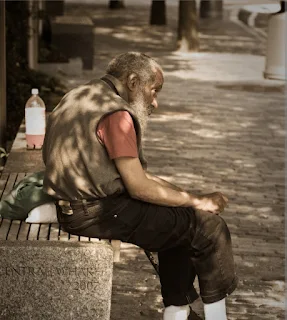How To Give Charity Wrapped in Dignity
I ended my previous blog, "Why Our Programs Will Never Stop Homelessnes," on this note,
"To fix homelessness, they don't need us. We need to need them."
As a follow up to this, here is a story about giving charity wrapped in dignity...
THE OLD EGG SELLER AND THE MADAM
"How much for the eggs?" Asked a well-dressed Madam.
The old seller replied, '$0.25 an egg, Madam.'
She said to him, 'I will take 6 eggs for $1.25 or I will leave.'
The old seller replied, 'Come take them at the price you want. Maybe, this is a good beginning because I have not been able to sell even a single egg today.'
She took the eggs and walked away feeling she had won.
She got into her fancy car and went to a posh restaurant with her friend. There, she and her friend, ordered whatever they liked.
They ate a little and left a lot of what they ordered. Then she went to pay the bill. The bill was $45.00, she gave $50.00 and asked the owner of the restaurant to keep the change.
This incidence might have seemed quite normal to the owner but, very painful to the poor egg seller.
The point is, why do we always show we have the power when we buy from the needy ones?
And why do we get generous to those who do not even need our generosity?
My father used to buy simple goods from poor people at high prices, even though he did not need them.
Sometimes he even used to pay extra for them. I got concerned by this act and asked him why does he do so?
Then my father replied, "It is a charity wrapped with dignity, my child."
-end story-
I have helped many people, experiencing homelessness. I have offered a place to stay for a short while, food, first aid care, etc.
One thing they all do in common, is offer something in return. No person likes to receive pity or a handout.
Often, all these people have to give in return is their labor or something they found somewhere else (i.e. found in a dumpster, or stolen / traded property), or drugs.
The labor I accepted, the rest I politely declined.
This is the currency of their community. They barter, sell, trade and deal, though not the kind of goods you'll see in stores (or maybe the very goods you saw in stores, now at a hefty discount).
Nonetheless, they have something of value to offer one another. They trade for what they need, like a place to sleep or food.
Many, are highly skilled craftsmen, artists, musicians or otherwise non-traditionally skilled. Meaning they won't fit in well in a 9-5 J.O.B.
We reject their attempts to pay their way with what they have, or with the skills they do possess.
Instead its easier to hand them a dollar and fund programs to help them off the streets than it is to lower our judgment and see the value of the human being which we've labeled homeless.
This charity and pity and well meaning "help" breeds shame, and division and a sense of worthlessness, hopelessness.
Eventually contempt arises for a society that no longer accepts them and for which they can contribute nothing to.
We strip that person's value with every charitable donation. Unless we can give charity wrapped in dignity, we will only further compound the problem of homelessness in America.
I would like to introduce the radical notion, that to solve homelessness in America, we have to help those exoeriencing it rediscover their value and find ways to meaningfully contribute to society again. To feel useful and needed by the tribe is innate and fundamental.
If they can't make that happen within our society, they will form their own, and they have. Honestly, good for them, but shame on us.


Comments
Post a Comment
Leave me a comment and share